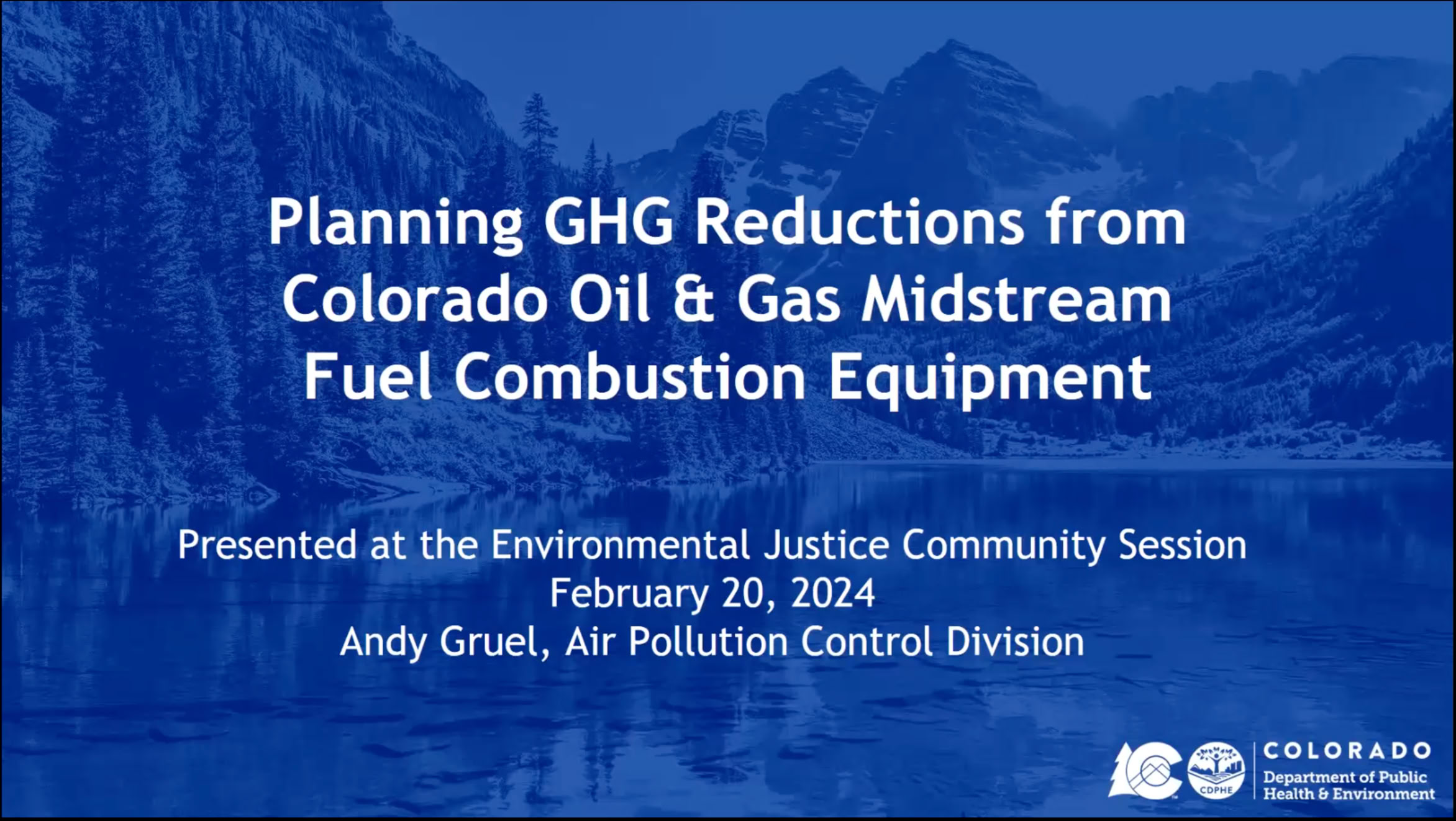February 20, 2024
Bill and Martin testified at the believe it or not, “Environmental Justice Community Session” that the APCD put on today.

Thought we were kidding? Here’s the 1st slide from the presentation. The midstream equipment that they’re formulating regulations for is stuff like heater-treaters and pumping stations. They are doing everything they can to destroy Colorado’s oil and gas industry!
Here’s Martin and Bill’s presentations. You can find pointers to the slides and the full video that Martin clipped this from at
https://cdphe.colorado.gov/midstreamGHGplanning
Here’s a rough transcript from Martin, we improvised a bit.
I'm Martin Sandberg, MSEE, and a member of the IEEE Power Society. I’ve now lived in Colorado for over 20 years. Going through that mid January cold spell, where we were below zero, under heavy clouds with no wind for two days straight, made us glad we had put in large propane tanks and a backup generator!
Getting the backup generator really showed us how over-regulated we are! Generac has to put limited size engines in their units to avoid the worst of the EPA regulations. Now Colorado is going to impose even further restrictions on the larger engines used to power pipelines and other mid-stream gear.
Once you look at a natural gas powered pumping station, you can see just how efficient this approach is. It burns a bit of the product right there so there are no electric generating station losses, no transmission line or transformer losses. Even the best combined cycle power plants are only about 60% efficient, so when you take that and all the other losses into account, electrifying these midstream engines doesn’t make sense. As Texas found out in 2021, electrification impacts reliability too.
In 2023, in the entire US, only 1,251 miles of high voltage transmission lines were built. This is because the cost to build new lines has now risen to almost $4 million a mile! Given the extreme cost and difficulty of building new grid capacity, it’s obvious we shouldn’t be adding additional load to the grid. In fact, Colorado should really look at the reliability issues that imposing additional loads on the grid will cause.
I ask the committee to step back from this rush to regulate and carefully consider not just the direct effects of regulations, but look at the unintended consequences as well.
And we should admit that using oil and gas has tremendous benefits, it’s not all costs! We have to take both sides into account.
Thank you for your time.
And Bill’s:
My name is Bill Hembree. I’m an Air Force Intelligence Command veteran and now-retired software engineer who has lived in Colorado for the past two decades. My late father was a petroleum engineer so I know a bit about the petroleum industry although my last summer job in the oil patch was in 1974.
The overall goal of the proposed fees we are commenting on today is CO2 emissions reduction. I won’t argue the wisdom of that since it is a legislative requirement and APCD needs to follow the legislature’s mandates.
However, and within the overall scope of the legislature’s mandates and Governor Polis’ executive orders, there is an outstandingly bad component to the proposed midstream fees. This is charging fees for using hydrocarbons in turbines and direct heating applications such as boilers and oilfield heater-treaters. This is typically done by using natural gas produced in the fields where the heat is needed. The proposed fees are obviously intended to encourage switching to electric heating for these applications.
But is this wise in terms of reducing CO2 emissions? Not at all. Weld County, the most affected area since it produces 82% of Colorado’s petroleum, gets much of its electricity from natural gas power plants which burn the gas to spin turbines.
Burning a BTU of natural gas to generate electricity will deliver less than half a BTU of heat at the end user site, although replacing turbines with electric motors is somewhat more efficient.
So using electricity in midstream heating applications will emit at least twice as much CO2 as using field-produced natural gas. I’ll also note that no petroleum engineer wants to burn product that they could sell, they are making engineering trade-offs to minimize costs, costs that consumers will eventually have to pay.
If APCD’s overall legislative mandate is to minimize CO2 emissions, adding fees which push oil producers to switch to electric heating is particularly counter-productive. I respectfully request that the committee go back to the drawing board and consider - and publicize - all of the effects before adopting new fees and regulations. Otherwise, we are just playing whack-a-mole.